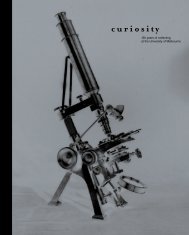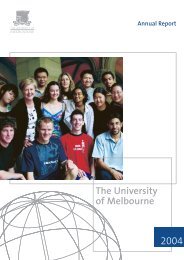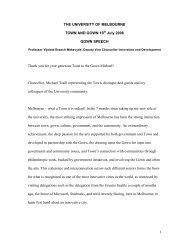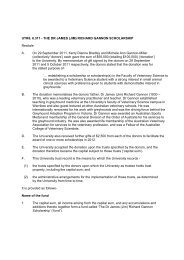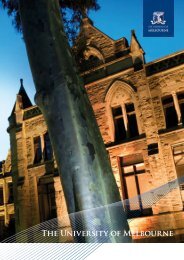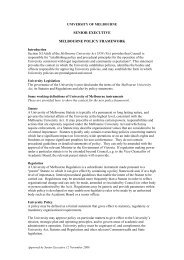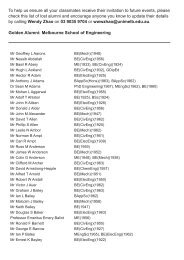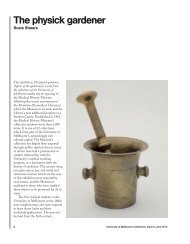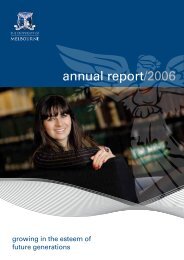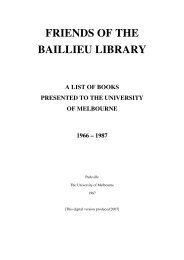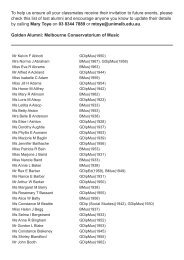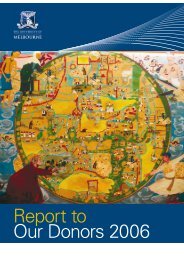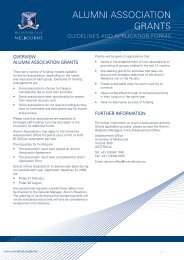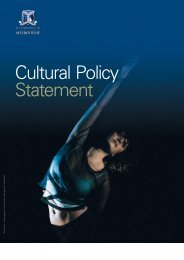2010 International Undergraduate Prospectus nts. u.au
2010 International Undergraduate Prospectus nts. u.au
2010 International Undergraduate Prospectus nts. u.au
Create successful ePaper yourself
Turn your PDF publications into a flip-book with our unique Google optimized e-Paper software.
54<br />
Professional and international<br />
degree recognition<br />
The Faculty of Veterinary Science is an<br />
AVMA Accredited Veterinary School. This<br />
means that Bachelor of Veterinary Science<br />
graduates are considered in the same<br />
category as graduates from North American<br />
veterinary schools when undertaking the<br />
licensing examinations in North America. As<br />
a graduate, you will be qualified to register<br />
and practise as a veterinarian throughout<br />
Australia and several other countries<br />
including Great Britain and New Zealand.<br />
For registration in Singapore and Hong<br />
Kong you must hold a recognised degree<br />
in veterinary medicine. As a guide, degrees<br />
recognised by the Royal College of<br />
Veterinary Surgeons, United Kingdom, are<br />
generally acceptable. Graduates with the<br />
degree of Bachelor of Veterinary Science<br />
from the University of Melbourne may<br />
register with the Royal College of Veterinary<br />
Surgeons. Further information on specific<br />
requireme<strong>nts</strong> for licensure should be<br />
obtained from the respective bodies in each<br />
country and state or province.<br />
Depth<br />
Developing your specialisation<br />
The Bachelor of Veterinary Science offers<br />
three main study areas: the healthy animal;<br />
the response of animals to disease; and<br />
diagnosis, treatment and prevention of<br />
diseases.<br />
Please note: Study in Veterinary Science<br />
involves the use of animals and animal<br />
tissues in practical classes. You should<br />
be aware that such use of animals is an<br />
essential part of this course and exemptions<br />
are not available. All sessions involving<br />
the use of animals are approved by the<br />
University’s Animal Welfare Committee.<br />
(The Committee membership includes<br />
community members with animal welfare<br />
interests.)<br />
Knowledge transfer<br />
Connecting with other stude<strong>nts</strong>,<br />
industry and the community<br />
You are required to gain practical experience<br />
in animal handling, care and management<br />
through the subjects Animal Health,<br />
Management and Welfare 1A and 1B and 2A<br />
and 2B (in the first and second year). Linked<br />
with this is a work placement requirement for<br />
two weeks with urban animal shelters and/<br />
or licensed wildlife rescue centres, and six<br />
weeks with commercial animal enterprises.<br />
In the third and fourth years practical<br />
experience is gained in the Veterinary Clinic<br />
and Hospital in the subjects Professional<br />
Practice 1, 2 and 3.<br />
Linked with this are the extramural<br />
professional work placement requireme<strong>nts</strong><br />
of four weeks rostered in the Veterinary Clinic<br />
and Hospital, one week gaining experience<br />
in dairy cattle medicine at the Rural<br />
Veterinary Centre at Maffra in Gippsland,<br />
and 12 weeks working in veterinary practices<br />
supervised by veterinarians appointed by<br />
the University as Academic Associates.<br />
Professional Practice 3 covers the whole of<br />
the final semester and allows the choice of<br />
four electives each of three weeks. Electives<br />
are available in the Veterinary Clinic and<br />
Hospital or outside the University with<br />
animal welfare organisations or Academic<br />
Associates. Overseas placeme<strong>nts</strong> are also<br />
available. You will be provided with guidance<br />
on your choice of placeme<strong>nts</strong>.<br />
The Veterinary Stude<strong>nts</strong> Society of<br />
Victoria (VSSV) is an active student<br />
society encouraging the participation<br />
of all stude<strong>nts</strong>. The Society supports<br />
several special interest groups where you<br />
can pursue your academic and practical<br />
interests in a particular aspect of veterinary<br />
science beyond the normal provisions of<br />
the veterinary curriculum ie. wildlife, bovine,<br />
sheep and horse appreciation groups.<br />
Graduate study opportunities<br />
Research opportunities, within Australia<br />
and internationally, following the completion<br />
of the Melbourne Veterinary degree are<br />
numerous and varied. At Melbourne, areas<br />
of study range from parasites of Australian<br />
native mammals to bone and muscle cell<br />
biology, from blood banking in dogs and<br />
cats to dairy cattle medicine. You can study<br />
at a Masters level or for a PhD. Some of<br />
our graduate stude<strong>nts</strong> are undertaking a<br />
research degree part-time while holding<br />
veterinary positions in the Veterinary Clinic<br />
and Hospital at Werribee campus.<br />
Coursework programs for professional<br />
development are available. Some are short<br />
courses and others lead to a Postgraduate<br />
Certificate or a Masters degree. The<br />
Avian Health online program is an exciting<br />
interactive web-based learning program<br />
allowing career development while<br />
maintaining a professional position.<br />
For more information contact:<br />
Veterinary Science<br />
t + 61 3 8344 7357<br />
f + 61 3 8344 7374<br />
e via http://vet.unimelb.custhelp.com<br />
w www.vet.unimelb.edu.<strong>au</strong>



